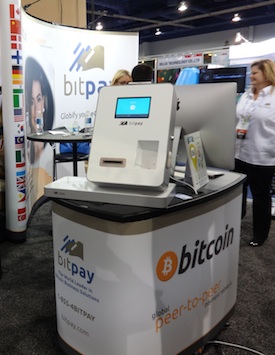
Open for business.
Four thousand transactions a day and total 2013 transactions of $100 million would be chump change for Visa or Mastercard, but it represents blindingly fast growth for Bitpay, which only moved $3 million in 2012. It’s an Atlanta-based transaction processor, one of three Bitcoin-related companies sharing a small booth in the back of CES’s south exhibit hall.
Bitpay is one of several companies that make it possible for merchants – big or small, online or bricks and mortar – to accept Bitcoins from customers and get dollars, or whatever national currency they prefer, in return. A web store, for example, can have customers click on an option in a shopping cart and send their Bitcoin payment directly to Bitpay, which will convert it to dollars at a guaranteed rate. Bitpay also supports point of sale systems for onsite purchases.
The company says it has 20,000 accounts, and that it verifies that the products and services offered are legitimate and legal. Low volume merchants pay 1% of the transaction value, higher volume ones can opt for bulk plans starting at $30 per month.
Blockchain is an online wallet service which eliminates a lot of the geekiness involved in handling Bitcoins. You create an account and generate two keys: public and private. Anyone can use your public key to send you a Bitcoin; you unlock it with your private key, which no one else – not even Blockchain – knows. It’s a free service that’s trying to generate revenue with ads, but its real purpose is to stoke the Bitcoin economy, to the benefit of its investors.
The third company, Butterfly Labs, makes Bitcoin mining machines – specialised computers that do the math that makes the system run and generates new Bitcoins for the people doing it. Counting the companies at Startup Debut on Monday night, seven Bitcoin-based ventures are at CES. Might not seem like many, but as foundations to build on go, that’s solid enough: it’s two more than the entire country of India sent.
